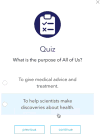Engaging populations underrepresented in research through novel approaches to consent
- PMID: 29512940
- PMCID: PMC5910200
- DOI: 10.1002/ajmg.c.31600
Engaging populations underrepresented in research through novel approaches to consent
Abstract
The lack of diversity of populations included in genomics databases is an important inhibitor of genomic discovery from bench to bedside. One way to increase the diversity of participants is to ensure that informed consent processes are designed for cultural and linguistic concordance for non-majority populations. This article describes two case studies of genomics research studies that are using novel approaches to informed consent to increase recruitment and retention of participants from traditionally underrepresented populations: The Cancer Health Assessments Reaching Many (CHARM) study, part of the Clinical Sequencing Evidence-Generating Research (CSER) consortium, and the All of Us Research Program, part of the Precision Medicine Initiative. We conclude by proposing a community of practice among researchers seeking to improve informed consent to increase diversity in genomics research.
Keywords: diversity; genetic and genomic research; informed consent; recruitment and retention; research ethics.
© 2018 Wiley Periodicals, Inc.
References
-
- AHRQ. The AHRQ informed consent and authorization toolkit for minimal risk research. Agency for Healthcare Research and Quality; Rockville, MD: 2015. [accessed on 20 January 2018]. URL www.ahrq.gov/funding/policies/informedconsent/index.html.
-
- Afolabi MO, McGrath N, D’Alessandro U, Kampmann B, Imoukhuede EB, Ravinetto RM, Alexander N, Larson HJ, Chandramohan D, Bojang K. A multimedia consent tool for research participants in the Gambia: a randomized controlled trial. Bulletin of the World Health Organization. 2015;93:320–328A. - PMC - PubMed
-
- Bellcross CA, Lemke AA, Pape LS, Tess AL, Meisner LT. Evaluation of a breast/ovarian cancer genetics referral screening tool in a mammography population. Genetics in medicine. 2009;11:783–789. - PubMed
-
- Cassileth BR, Zupkis RV, Sutton-Smith K, March V. Informed consent—why are its goals imperfectly realized? New England Journal of Medicine. 1980;302:896–900. - PubMed
Publication types
MeSH terms
Grants and funding
LinkOut - more resources
Full Text Sources
Other Literature Sources



